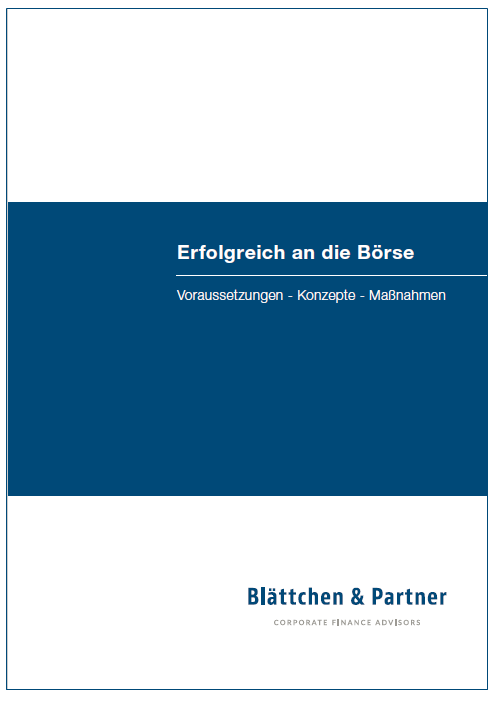The completely revised new edition of the brochure “Successful on the Stock Exchange” is now available.
In this brochure, Dr. Konrad Bösl bundles his experience of around 60 personally accompanied IPOs. The reader will be given a wealth of experience, which is sometimes reflected in small – otherwise rather unnoticed – details, which are crucial for the success of the IPO and for the share price development after the listing.
Below is a pre-reading sample. You are welcome to order the complete printed edition free of charge via our contact form.
Preface
Entrepreneurship means making decisions that prepare the company for changing environmental conditions early and systematically. An important entrepreneurial decision is equity capitalization. This must keep pace with the company’s growth and growth potential. Only a strong equity base gives the company stability and opens up further credit scope at attractive conditions. These considerations should be enough of an incentive for entrepreneurs to think intensively about how they can improve their equity base and their ability to raise equity. IPOs stand out as the ideal way to raise equity capital because, unlike other sources of financing, they can provide the company with considerably more tax-free equity capital.
In many medium-sized companies, going public is not even considered as an alternative to raising equity capital because there is a lack of knowledge about it. And even in companies that are considering or have decided to go public, there is a relatively large lack of information about the process and the central decision-making parameters. This brochure has therefore set itself the goal of providing medium-sized entrepreneurs with well-founded and objective information about this important, usually unique step.
The brochure bundles the experience of around 60 personally accompanied IPOs. The reader can therefore be provided with a wealth of experience which is sometimes reflected in small — otherwise rather unnoticed — details, but which are of decisive importance for the success of the IPO and for the development of the share price after the listing.
1. IPO — why?
One of the primary issues of German SMEs is the insufficient equity base. Although the IPO (also known as going public) is an excellent opportunity to raise equity capital, it is only hesitantly used by medium-sized companies. In addition to the lack of information about an IPO, another reason is the predominance of family-owned or owner-managed companies among SMEs. Such companies find it difficult to include a large number of new shareholders in the previous (rather closed) circle of owners, to publish information on business development on a regular basis and to give external accountability.
Despite these arguments, a number of medium-sized companies that are still family-owned are listed on the stock exchange. Obviously — as surveys of listed companies show — the aspects of an IPO that are perceived as negative are (clearly) overestimated. Of course, the capital increase for the IPO requires an expansion of the circle of shareholders. However, the influence of the former owners on the company is not endangered as long as they hold the majority of shares. On the contrary, strengthening the equity base ensures the continuity and independence of the company for the previous owners. The information obligations arising from the stock exchange listing and the reactions of investors reflected in the share price development represent an effective corrective for a sustainable value-enhancing corporate policy. And it is the former owners who benefit most from this.
Irrespective of this, the entrepreneurial aspects should be in the foreground when deciding on an IPO. The (significant) improvement in the equity base associated with an IPO strengthens the company’s ability to adapt to changing environmental conditions. This is necessary because the majority of medium-sized companies today are faced with the problem that technological leaps, shorter product life cycles or necessary strategic investments require high financial input. At the same time, SMEs can no longer rely on extensive loan financing from banks, as they used to, especially when their equity capital base is weak. As a result, equity capitalization and the ability to raise equity capital are decisive factors in determining the competitive opportunities of companies.
.….…..



